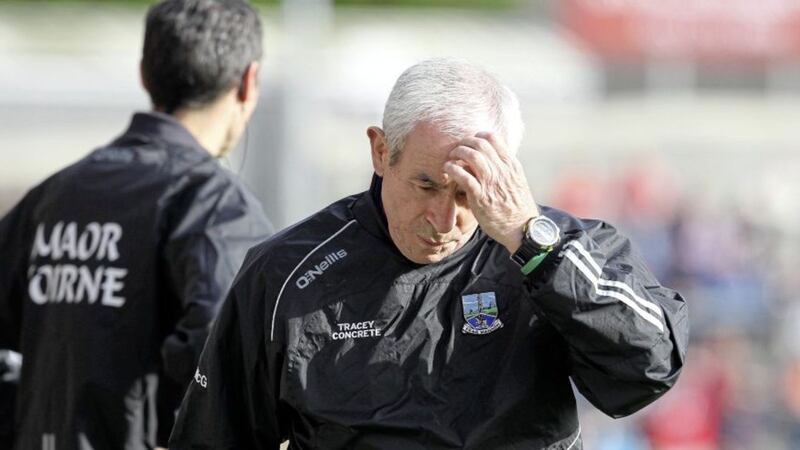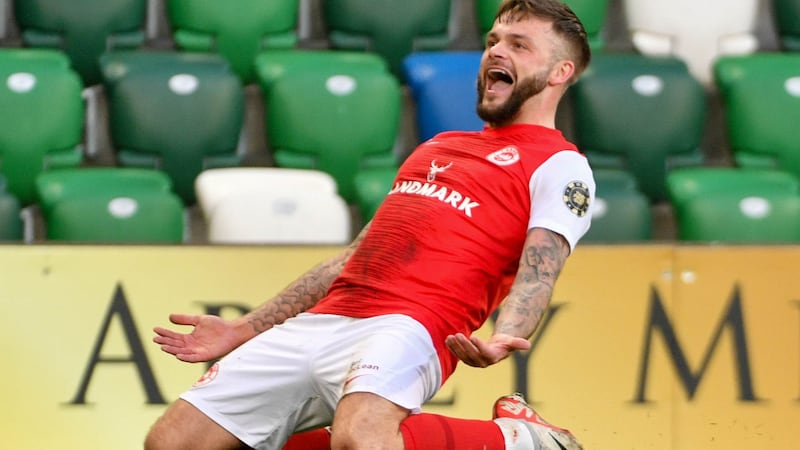IF you didn’t know any better you could be forgiven in thinking that the GAA has stolen the clothes of the English Premier League.
With each passing year the GAA is becoming deeply infected by the multi-billion pound soap opera industry across the water.
On some level we’ve all got carried away with ourselves.
Carried away with tactics, gameplans and how to counter-attack properly.
Carried away with abstract ideals and theories.
There's a bit of Pep Guardiola in all of us.
Perspective has been parked at the door of our Twitter and Facebook accounts.
Hyperbole roams these on-line corridors like an insatiable beast.
Managerial reputations aren’t just lowered; they’re unmercifully shredded into a million indecipherable pieces.
It’s important to rush to judgement. In this game, impatience is a virtue.
Print and broadcast media make a lot of noise too.
Expectations rise to unfathomable levels and as a consequence there is a rush towards change. Often change for change's sake.
It's a contagious disease.
Players, county officials, even casual observers reach giddy consensus.
When you survey the various wreckages in Ulster this summer, it begs the question: who would be an inter-county manager?
Arguably the biggest controversy this summer occurred in Fermanagh.
The Fermanagh players grew impatient with Pete McGrath.
So they got rid of him.
It had something vaguely to do with team selection and subs getting game-time before other subs.
It's interesting to note McGrath performed better in his first couple of years than Kieran McGeeney did in Armagh.
The difference? Loyalty.
There wasn't a hint of dissent - on or off the record - among the Armagh players.
Damian Barton was unceremoniously dumped by Derry after two seasons.
When you consider how they recovered from last year’s Ulster Championship hammering to Tyrone to be within a whisker of reaching an All-Ireland quarter-final and how they pushed Mayo to extra-time in Castlebar last month, you can't escape the conclusion that Barton was treated very harshly.
When you consider the amount of players that were unavailable between 2016 and 2017, makes Barton’s performance all the more admirable.
And then there were his work conditions - Barton described it as operating "with one hand tied behind your back" - that you wouldn’t inflict on your worst enemy.
In Tuesday’s edition of The Irish News, former boss Damian Cassidy articulated the difficulties Barton – or indeed any Derry manager – encountered in the role.
“This culture that’s been developed in Derry is now at epidemic proportions,” said Cassidy, “where supporters and people who follow it at club level have been piping in players’ ears for so long about ‘don’t go to the county team, that’s a waste of time’ that it’s now a serious issue.”
Cassidy added: "[In Tyrone] Padraig Hampsey sat on the bench all last year [in 2016]. That would never happen in Derry.”
It goes without saying Barton deserved another year in post.
But the more simplistic the narrative, the more traction it gets.
We make too much of a manager’s “tactics” and not enough of the high number of players who are missing.
Derry’s reserves were well and truly ravaged in 2017. Ditto in Fermanagh.
So the manager takes the hit.
Rory Gallagher resigned from the Donegal post recently.
All these counties who dispense with their senior managers with unnecessary haste must believe that a Messiah or a coaching prophet lives among them and that a utopian existence awaits them in 2018.
In Antrim, Frank Fitzsimons and Gearoid Adams had to go through a nominations process.
In GAA parlance, nominations usually mean hiding behind procedure.
On the face of it, Antrim’s season was a disappointing one. They got relegated on the last day of the NFL season and were gone from the Championship after two games.
But anyone who attended their Dr McKenna Cup games up in Glenavy at the turn of the year would appreciate the poor state the senior team was in.
They virtually had to build a team from scratch.
By the end of Antrim’s season, there were more pluses than minuses when you consider how well so many of the rookie players performed in their first year at senior inter-county level.
Fitzsimons and Adams did Antrim a favour.
For four years, Pete McGrath did Fermanagh a favour.
After Brian McIver stepped down, there weren’t many GAA Philosopher Kings banging Derry’s door down to point them to the Promised Land.
If Armagh would have fallen to Westmeath in Mullingar in early July – where they very nearly did – Kieran McGeeney would have come under immense pressure to vacate the post.
Worse, Mickey Harte couldn’t get an extension as Tyrone manager at the end of last year.
And yet, what’s stopping Red Hand officialdom announcing today that Harte will be senior team manager for another three years?
Given the financial constraints, increasing player absenteeism, club-county sniping and ridiculous expectations inter-county managers are saddled with, you would have to be insane to want to manage at that level.
No wonder some of the best managers remain on the club circuit.
In a lot of instances it’s more lucrative and a lot less hassle.
Of course, a central tenet of sports journalism is to critically examine the performances of managers, players and county officialdom.
But there’s a difference between crude ridicule and critical analysis.
The GAA, more than ever, needs county boards with a steady hand that don’t fall to the capricious whims of their public.
As some of them embark on their search for a sideline genius this autumn they will be searching for quite some time.
The 16th century philosopher Thomas Hobbes was generally a pessimistic thinker.
When he crafted the famous phrase that life could be “solitary, nasty, brutish and short’ perhaps he knew what was coming to the poor inter-county manager.









